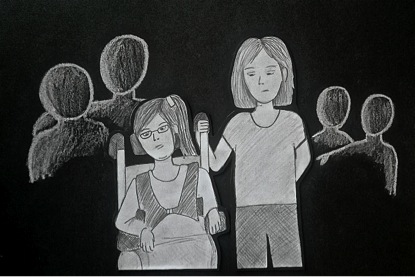Resilience in the siblings of disabled children
This piece shows two sisters, one living with cerebral palsy. Her sister, Jane*, rests a hand on her wheelchair representing how she feels she must be there to look out for her sister who is unable walk or communicate with words. Jane’s ambiguous facial expression is intended to represent the variety of emotions she feels. On one hand, frustration, embarrassment, resentment and sadness, but on the other, love for her sister – the only sibling she has.
I can unquestionably empathise with Jane as I myself am a sibling of a disabled person. I can remember vividly how it felt to have a disabled brother when I was younger and less resilient. I felt resentment about feeling ignored, embarrassment at others staring, and was upset about things that I couldn’t do – thanks to my brother. Even nowadays, when at home I get stressed trying to deal with his challenging behaviour, and spending days caring for him instead of seeing friends or keeping on top of work.
Current literature in this area suggests that if siblings have a strong sense that their life has a purpose and meaning, they are more likely to overcome obstacles relating to their sibling’s disability and things that they cannot do, therefore they are more resilient. Their sibling may even aid their sense of purposiveness in helping and looking out for their sibling – they may become more determined.
Whole Person Care, Year One, 2014

0 Comments